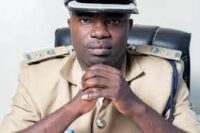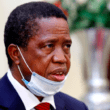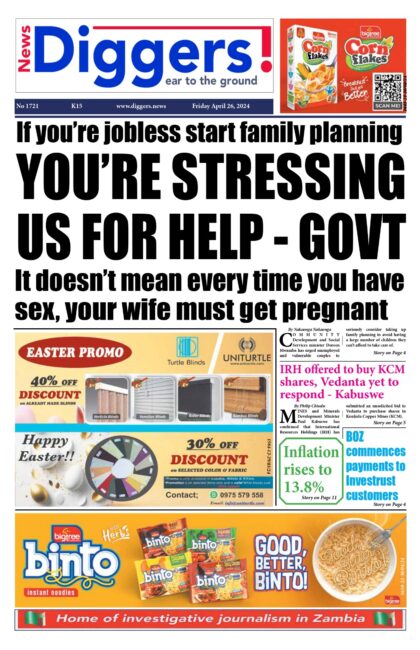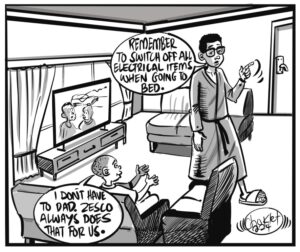EASTERN Province Minister Makebi Zulu says the Constitutional Court found it unnecessary to clearly answer whether President Edgar Lungu is eligible to stand for the 2021 general election because he has only served one term so far.
But Constitutional lawyer John Sangwa SC has insisted that President Lungu is ineligible, saying he finds it difficult to be silent when Zambia’s constitutional principles are being abused.
The two were speaking when they featured on a Diamond TV programme dubbed COSTA, Sunday.
When asked if President Lungu was eligible to stand in the 2021 presidential election, Zulu responded in the affirmative.
“I will say in the affirmative, yes. Let me start on this point of view, I think S.C. Sangwa is not defending the Constitution, but he is defending his opinion because what the Constitution says has been determined by the Constitutional Court. He makes reference to page 51 where the court gave guidance to the litigants as to how they should frame their questions and in this particular thing, the only thing they did was to remove the name ‘Edgar Chagwa Lungu’ from the question, but the substance of it remains the same. And it made reference to the presidential term of office that ran from January 25 to September 13, 2016. Who was holding that position? It was Edgar Chagwa Lungu. It is not talking about anybody else, but they encouraged to say, ‘do not personalize the issue, there is no argument that could have been presented by any of the parties that could have been different from the….so what we have in this particular case is the determination by the Court or an interpretation of 106 (3) and (6). If you look at the whole of 106, it also determines what it means to hold office, and application of the Constitution is not discriminatory in its application where you say, ‘no, it only applies to this one, it doesn’t apply to another,’ it doesn’t happen that way. The argument that S.C. has been preferring to the public are not different from what he brought before the Court. On page 25, S.C. made submissions; I would love to go through some of his submissions that he made to show he has been consistent with his arguments, brought them out of court into the public now,” Zulu said.
“The third line says in a position: the applicants’ originating summons for the first interested party, Mr Sangwa S.C. relied on first interested party skeleton arguments filed, which were divided into two parts. Under the first line, the first interested party raised four arguments, which is relating to local standards and others, which as earlier stated we shall not delve into. And I am going to look at the operative part, which I wish to rely on for purposes of this argument. The second line of the second interested party written submissions in response to the two questions raised in the originating summons. It was submitted that in the first question raised in the originating summons ought to be answered in the affirmative. That is to say President Edgar Lungu has twice been elected to the Office of President of Zambia, therefore, that under the Constitution, he is not eligible to contest the 2021 presidential election. And that the second question raised in the originating summons must be answered in the negative that is to say, under the current Constitution, President Lungu is not eligible to stand in the election for another five-year term after his current term of office ends. Now, there are three things that are being talked about here: the holding of office twice; being elected twice and what it means to hold office. These are the things that the Court had to determine. And in this particular case, to have served a term it is very clear: ‘not less than three years.’ And the law has been consistent as regards to all these things. Even previously in the other regime, for example, if president Rupiah Bwezani Banda would have served for less than three years in that particular regime, he would not be entitled to benefits that are accrued to a former (Republican) president because he would not have served at least two years. The issue of Former President’s Act only entitles a former president to be entitled to those benefits if he has been in office for at least three years.”
Zulu, who is also Malambo PF member of parliament and a lawyer by profession, however, admitted that the ConCourt did not answer the question of President Lungu’s eligibility.
“So, when the Constitutional Court came to a conclusion, what he served for that particular period from June until September did not amount to a term. The Court said it did not amount to a term. He did not serve two terms. The issue of holding office comes in 6 (b) where it says, ‘to have had held office, you should have served three years’ then you would have been deemed to hold office. That is why the Court found it unnecessary to go to the second question when they are saying that, ‘this gentleman has only saved one term,’ therefore, it is unnecessary for us to say whether he should go ahead because it has answered itself. The application of the Constitution should not be discriminatory in its effect. You would have had President Edgar Lungu serving six years, eight months as having served two terms, and then in another vein, you would be saying he should serve for a period of five years and the Constitution itself prescribes what a minimum of five years should be. Now, I am wondering why S.C. has moved his argument from the Court; the Court has disagreed with him,” he argued.
Zulu insisted that President Lungu did not serve a full term between January, 2015 to August, 2016.
“In the 2016 amendment, the Constitution stands. It doesn’t talk about swearing in twice because that has been used to mislead the public. It is not a person who has been sworn in twice, it is a person who has held twice the Office of the President. And to have held office, you must have a minimum of three years. Now, under this regime, it is possible that there can be a president, who has served eight years, there could be a president, who would have served 10 years; there could have been a president, who has served 12 years less a day before it is three years, it is possible. To discharge functions of the office does not mean you held office; you serve a term, and a term is defined as to what it is and a term is at least three years! If you serve less than three years, it is not a term. The law is what the ConCourt pronounced to be and not what SC’s opinion is. Any person who holds office less than three years is not deemed to have held office. In accordance with Article 106 (a) and (b),” argued Zulu.
But Sangwa said his conscience would be troubled if he remained silent on the abuse of the Republican Constitution.
“Before 2016, if you check Article 34, it says, ‘notwithstanding anything to the contrary, contained in this Constitution or any other law, a person who has twice been elected as President shall not be eligible for re-election. There’s this misconception that we have the 1996 Constitution and the 2016 election, no we don’t! What we have is the Constitution of 1991, which was amended in 1996 and 2016. That is why I disagree with the Constitutional Court, saying there’s straddles between two constitutional regimes. We haven’t had two constitutional regimes; we have one constitutional regime, which we have amended. In (Article) 35, we are talking about two elections. When a government amends a Constitution or introduces any piece of legislation, I think they need to take time to read and understand what they are doing. And clearly, all those people that are basically throwing attacks on me, clearly, they have not read the Constitution! And if they have read it, they have clearly not understood it. The starting point is that if you read Article 2 of the Constitution, that article imposes a duty and a right on each and every person to defend the Constitution,” said Sangwa.
“It is a duty and it is a right and that is what I am doing. I do not need anybody to sponsor me, and by the way, this clause was never there before the amendment in 2016. My motivation is very simple: I have interacted with well over a 1,000 lawyers during my 20 years at UNZA…actually more than that. And I taught some of these constitutional principles. Now, I find it difficult, and my conscience troubles to be able to see these principles being mutilated and being ignored, being abused and for me to remain silent. That is something I find difficult because if I do that, I will likely be a hypocrite because then it means that everything that I taught over my 20-year period at UNZA was basically a lie! I am trying to prove that these constitutional principles are not just principles; they are real and that is basically what I am doing. When President Lungu stood in 2015, this was before the amendment; he knew that he had already been elected once when he was sworn-in in January, 2015. The number of times that he was going to stand, he already knew when he participated in the elections to say that already counted. We are now talking about holding office. If you check pre-2016, no person could ascend to the office of the President without being elected.”













8 Responses
Sorry Makebi. ECL cannot be sworn nore than twice. It’s the law. It is not mandatory for ECL to serve two terms! But it is the law not to be sworn more than 2 times!
As a layman,I have one simple question for the learned Makebi Zulu.Suppose one is elected and serves a full first term(five years) and reelected again for a second term and by one reason or another decides to resign before completing his term.Then after some time (e.g twenty years) decides to run for presidency again.Is this person going to be allowed for this third time?
My question Mr dull lawyer is how did he become president the first short time? Answer he was elected, then elected again, in total he has held office twice, so you want him to rule more than 10 years, what kind of greedy thieving leaders are you ??
You had all such idiots wasting their years at the University painting to kadoli and later masquerade as lawyers.
People who are accusing others of not reading are themselves guilty of not reading. The Constitution is written in English not in a legal language and anyone who has no problem with the English language can and should understand it and promote and defend its ideals. That is why article 2 imposes that burden on every citizen, not just those who have passed through a Law school.
Therefore, if you read it correctly, you should come to the conclusion that a person can now (after 2016) serve 3 Terms, but can only hold office twice. The definition for holding office is in article 106 (6) a & b. This is clearly different from the ordinary English word “Holding” as it has been specified as serving a Term that is at least 3yrs long.
So for a person to be DEEMED to have held office twice, they should have had two Terms which were at least more than 3yrs each. For example, if one comes to office and serves the remaining Term for 3yrs and one month, and then elected to another Term and leave office after another 3yrs and one week, they will have held office twice, without serving any 5yr Term.
The limit of two 5yr Terms no longer exists in the Constitution. But the maximum of any single Term is still 5yrs. We now have two types of Terms:
1. A limiting Term (more than 3yrs); and
2. A non-limiting Term (less than 3yrs)
ECL, has the rare opportunity of serving 3 Terms, but for purposes of article 106(3) will have only held office twice (2016-2021) and (2021-2026) if elected. Jan 25th 2015 to 13th September 2016 does not count as holding office, as it is a non-limiting Term.
If president Lunngu had died between 2015 and 2016 would he had accorded the presidential status if yes then saved term and if president Lunngu received salary then he was hired by zambians to save them so no matter how knowledgeble people may be it is wrong to loose wisdom
A lawyer who says that ECL didn’t hold office between 2015 and 2016?
Did this man pass ZIALE?